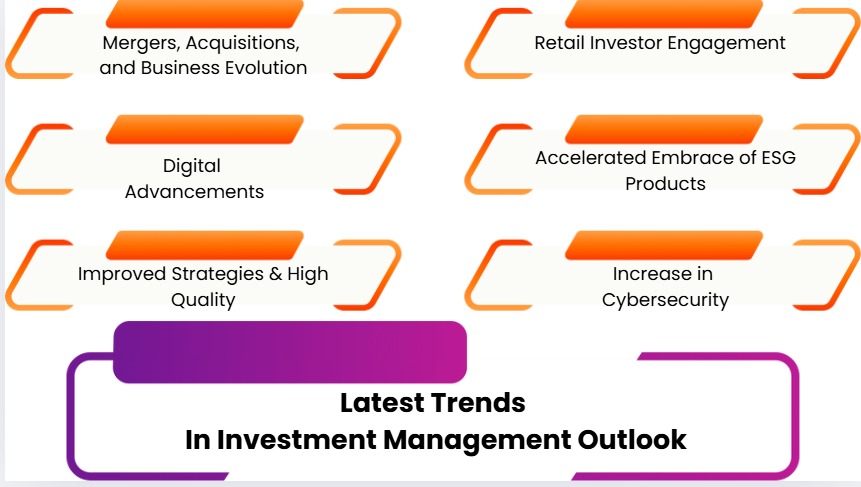Investment Management Outlook 2024: Shaping Canada’s Economy
In understanding Canada’s economy, the investment management sector stands out with a notable CAGR of 4%. 2024 promises further momentum and evolution. In this blog, we’ll explore Canada’s investment world and discuss what’s ahead for the coming year.
What Is Investment Management?
Investment management involves professionals overseeing assets and funds on behalf of clients, aiming to achieve specific financial objectives. These objectives often include capital appreciation, income generation, or a combination of both.
Managers make informed decisions on asset allocation, buying and selling investments, and monitoring performance, all aligned with the client’s risk tolerance and financial goals. Their expertise covers a range of investment vehicles, from stocks and bonds to real estate and alternative investments.
Investment management brings a proper understanding of your budget, earnings, savings, and investments in different forms of assets and then channels your money into the best investment plans.
Status of Investment Management in Canada
Canada is one of the fastest growing countries which has shown great opportunities for investment management companies to flourish in the market. Due to the presence of these top investment companies in the field of investment and asset management, the overall competition has risen for the new firms and existing medium-sized investment firms.
Furthermore, there’s a notable shift towards elevating client experiences, driven by rising digital expectations post-pandemic. While technology rapidly transforms service delivery with streamlined platforms and financial tools, the essence of face-to-face interactions remains integral.
Wealth management firms emphasize cohesive digital and personal touchpoints, enhancing advisor capabilities, especially for high-net-worth clients. A prominent trend is the demand for “holistic” wealth advisory services, emphasizing goals-based approaches.
In the pension sector, there’s a push towards digitization, offering real-time insights and virtual educational resources, emphasizing efficiency, client experience, and sustainability.
Moreover, there’s a growing focus on sustainable and climate-themed investment products, reflecting consumers’ desires for impactful and environmentally responsible investment outcomes.
Institutional investors are increasingly seeking tailored solutions harnessing advanced data analytics and emergent technologies. This tech-driven evolution welcomes non-traditional players, intensifying competition and challenging differentiation.
Concurrently, there’s a surge in demand for private and alternative products, disrupting traditional distribution channels. Asset managers are innovating and introducing new products and services to cater to a growing segment favoring self-directed investing. Yet, defining one’s position amidst these changes remains a challenge.
How is Investment Management Shaping Canada’s Economy?
Canada’s investment and savings market has shown incredible growth because of the setup of many investment companies and the increased number of HNW investors in the market.
The financial status of the country, along with its investment industry, went down because of the pandemic. Still, the post-pandemic era has come out to be very blooming for the economy of Canada.
Whether it’s equity, deposits, mutual funds, bonds, or the latest applications, data analytics provides you with the best investment options in the market.
Role of Technology in the Growth of Investment Management
The improvements and advancements have brought digital products into the investment market. Technology has changed the investment management industry because now companies make investments cleverly.
This growth of technology has estimated the global spending of 1.67 billion dollars by the year 2030 and it is impressive and highly beneficial for the overall economy of Canada.
The understanding of the past as well as current data has improved with the use of the latest technology. The latest tech helps companies read the data more accurately and use the algorithms to provide the right kind of investments.
The updated technology is capable of reading the person’s profile, understanding their requirements, and then offering a complete analysis. This later helps companies in providing high-quality services to their end users.
Latest Trends In Investment Management Outlook: 2024

The investment management landscape for 2024 is marked by strategic shifts and evolving priorities in response to global economic uncertainties, changing client preferences, and emerging trends. Let’s discuss the current and upcoming trends in the investment management industry in Canada:
1. Mergers, Acquisitions, and Business Evolution
As 35% of business executives anticipate acquisitions or divestitures, Asset and wealth Management (AWM) firms are strategically repositioning themselves. Whether organically diversifying into new asset classes or pursuing inorganic growth via acquisitions, firms are bracing for potential global recessionary impacts.
This forward-looking approach is prompting large players to augment capabilities, emphasizing ESG solutions, distribution, and technological prowess, often through mergers and acquisitions.
Concurrently, niche managers are refining their value propositions, targeting specialized expertise and client segments. Meanwhile, mid-tier firms face the dual challenge of differentiation and operational efficiency, necessitating judicious investment decisions and potential collaborations with industry specialists.
2. Retail Investor Engagement in Alternative Investments
The alternative investment landscape is witnessing a paradigm shift. Despite 62% of High Net Worth Individuals (HNWIs) exploring alternatives, a significant portion is venturing beyond their primary wealth management providers.
So, firms should craft robust retail investor strategies. However, scaling alternative offerings for retail investors demands specialized capabilities, cautioning firms against hasty expansions that may strain resources.
3. Accelerated Embrace of ESG Products
ESG (Environmental, Social, and Governance) investments continue their ascendancy, with 81% of institutional investors amplifying their ESG allocations. To resonate with this momentum, AWM firms must recalibrate their operational frameworks, ensuring alignment with contemporary ESG imperatives.
Crafting a compelling ESG narrative, instituting transparent reporting mechanisms, and integrating ESG considerations into digital and workforce strategies become paramount. This holistic approach not only enhances client trust but also underscores the firm’s commitment to sustainability and value creation.
4. Digital Advancements
Looking at the continuous advancements in technology and rapid growth in investment companies, we can say that digital improvements will continue to grow in the coming years. Technology is helping in making strategic decisions, improving client relationships, and managing financial assets; therefore, big companies will invest more in driving the latest technology into their businesses.
5. Improved Strategies & High Quality
The next investment management outlook for the next year would be that companies will focus on improving their strategies because of the requirements of the consumers.
Investors will prioritize the wider portfolio based on ETFs and the financial goals of their end users. The newer and better strategies will bring high-quality decision-making. These strategies will help companies understand the needs of their customers better, and the company is providing user oriented services.
6. Increase in Cybersecurity
Cybercrime is one of the reasons why companies should focus more on having strong cybersecurity systems to protect their data and asset information. Data shows that 55% of financial institutes are the victims of these cybercrimes.
People perform the wrongdoing using the name of the big investment management companies and the consumers get affected. Ransomware is the most common cybercrime that affects investment management companies.
The Bottomline
Technology will play a big part in the success of investment management companies which will ultimately help in the economic growth of Canada. The economy will improve automatically when the companies will focus on creating data-driven analysis, which will increase efficiency and reduce the risk of the investors.
Looking at the technological advancements and the risk management strategies of the companies, we can say on a positive note that these top-ranked investment management companies Outlook for 2024 looks promising.
FAQs
What is the best investment management company in Canada?
Determining the “best” investment management company in Canada is subjective, as it depends on individual goals and preferences. Major players include RBC Global Asset Management, TD Asset Management, and BlackRock Canada.
Is investment management a good job?
Investment management can be a rewarding career for those interested in finance, analytics, and strategic decision-making. Success often depends on skills, market knowledge, and the ability to navigate financial complexities.
What are the big 3 investment firms?
The “big three” investment firms typically refer to BlackRock, Vanguard, and State Street Global Advisors. They are global asset management giants, managing trillions of dollars in assets.
Is Canada a good place for investment banking?
Canada has a reliable environment for investment banking with a stable economy. Major cities like Toronto have a thriving financial sector, making it an attractive location for investment banking activities and opportunities




